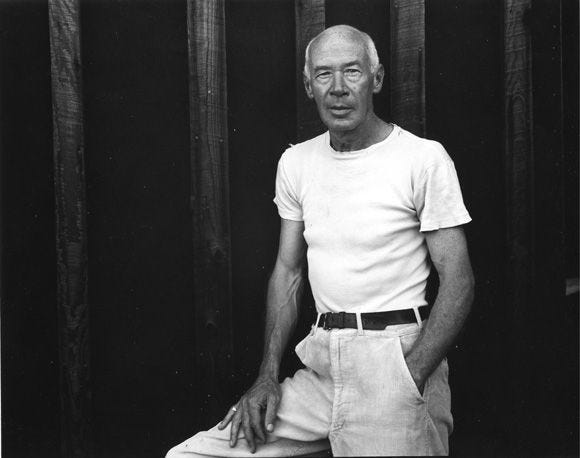What does Henry Miller have to do with exercise?
Not much, to be honest.
Henry Miller was known for his subversive novels like Tropic of Cancer and Black Summer—books that broke literary tradition, crossed genre and stylistic lines, and got banned in the US. His 11 Commandments, though directed at the author himself & other writers, have a universality to them that ring true across all parts of life.
Henry Miller's 11 Commandments of Writing
Work on one thing at a time until finished.
Start no more new books, add no more new material to ‘Black Spring.’
Don’t be nervous. Work calmly, joyously, recklessly on whatever is in hand.
Work according to Program and not according to mood. Stop at the appointed time!
When you can’t create you can work.
Cement a little every day, rather than add new fertilizers.
Keep human! See people, go places, drink if you feel like it.
Don’t be a draught-horse! Work with pleasure only.
Discard the Program when you feel like it—but go back to it the next day. Concentrate. Narrow down. Exclude.
Forget the books you want to write. Think only of the book you are writing.
Write first and always. Painting, music, friends, cinema, all these come afterwards.
Since this is, ostensibly, a newsletter about fitness/movement/etc, how can we relate this to exercise?
4. Work according to the program and not according to mood. Stop at the appointed time!
Having a set program with intentional goals aids us in exercising by whim—picking up the weights when we feel like it and skipping when we’re not feeling like it, and never finding consistency in our practice. However, while perseverance and consistency are central parts of making progress, this doesn’t mean that the process must be utterly lacking in soul, or a joyless burden through which we must suffer. It can (and should) be enjoyable:
7. Keep human!
and
9. Don’t be a draught-hose! Work with with pleasure only.
The process of learning, moving, and working hard physically can be an enjoyable and fulfilling task, if we find the right space and pursuits that speak to us. Then we can, as Miller says in #3, work calmly, joyously, and recklessly.
Whenever I revisit this list, I discover something new about it. Where I am in that moment reveals a new perspective, or a different understanding of a line I've read a dozen times before. Lately I’ve been accepting Commandment #9:
"Discard the Program when you feel like it - but go back to it the next day. Concentrate. Narrow down. Exclude."
The second part of #9 reminds me of the Bruce Lee that’s quoted to the point of nigh meaninglessness: Use what works, discard what doesn't (summarization of full quote). Put aside the unnecessary, and focus on the things that bring you the most value.
The part that I’ve been considering lately is the first part: Discard the Program when you feel like it - but go back to it the next day. It’s okay to miss exercise occasionally, as long as you remember that you’re not “bad” for doing it, and that you know you’ll be able to get back to it tomorrow, the next day, or whenever you’re able. The day is not what matters - it is consistency over time. So what if you don't do exactly what you planned on that day? Days accumulated over time into weeks, months, and years are what takes you from point A to B.
So skip a day. It's fine. Do something different than what's on the paper. It's going to be OK. Go back when you're ready. The Program will still be there, and you'll be better off missing a day than if you forced yourself to do it until you burn out.
What do you think?
What can you take from the 11 Commandments?




